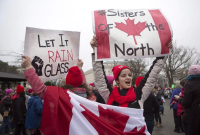Support strong Canadian climate journalism for 2025
Thousands of Canadian women looked to the future while acknowledging the past on Saturday as they took to the streets for a second co-ordinated round of protest marches.
The scenes in dozens of communities coast to coast were reminiscent of the women's marches that sprang up around the globe a year ago this weekend in the wake of Donald Trump's inauguration as U.S. president.
Fuelled by anger over Trump's divisive policies and boasts of sexual misconduct, hundreds of thousands of people organized marches around the world and used the events to proclaim messages of inclusion, equality and empowerment.
One year later, marchers were out in force again in hopes of extending those messages to an even wider audience.
In Montreal, amid a colourful sea of knitted caps and homemade signs, hundreds of people packed a downtown square for an event organizers characterized as a fight for the rights of women of all races, political affiliations, sexual orientations and gender identities.
U.S.-born Montreal resident Amandah Goldsmith showed up alone, carrying a sign that read "All colours, all nationalities deserve rights and respect."
Goldsmith was one of the estimated half-million people who converged on the U.S. capital of Washington in last year's most high-profile women's march.
On Saturday, citing a rise in right-wing sentiment and increasing polarization in the U.S. that led to a government shutdown Friday night, Goldsmith said it was more important than ever to take a stand for human rights and ensure they are preserved in her new home.
"I'm here to protect Canada because it's happening all over the world, a fear, and it's springing from pure ignorance," she said. "So the more people go out and speak, the better off the world will be."
Prime Minister Justin Trudeau offered assurances that equality and women's rights will remain priorities for his administration.
"It’s incredibly inspiring and motivating to see so many people come out to support women’s rights," Trudeau tweeted Saturday afternoon.
"We see you, we hear you ... and our government will keep fighting for gender equality in Canada."
Many of Saturday's protesters said they felt propelled by a sense of momentum they could hardly have imagined during last year's marches.
Canadian organizers said 38 communities are hosting marches, rallies and other events, representing a 20 per cent increase from the number that took part last January.
Numerous activists pointed to a shift in the way women's voices have been heard and acknowledged in the year since the original march.
Many referenced the #MeToo phenomenon, an outpouring of women speaking out about their experiences with sexual harassment and assault. That outpouring was itself the result of powerful men, including Hollywood titan Harvey Weinstein, being called to account for alleged sexual misconduct.
Boo Geyer, organizer of a rally in Vancouver, said the message has already begun to reach a wider audience.
"I think (our voices) are getting heard louder and louder every day because the people at the grassroots are now talking to the people at the water cooler or the people on the bus," Geyer said. "And now women from all different economic or gender and racial spectrums are talking together and realizing that it's a problem that universally affects everybody."
Rather than dwelling on the successful expansion of their cause, however, activists in Canada and abroad used the events to focus on the future.
"This year it's ... moving more into tangible actions," said Jillian Coey, one of the thousands of women attending a gathering in downtown Toronto. "Really shifting the conversation into the realm of things that have not historically been talked about or believed."
Amid the calls for unity and inclusion, however, some groups argued that the loosely organized movement lacked focus, while others said it had not allowed their voices to be heard.
Sonia Kont, the communications chair for Alberta's United Conservative Party, said such "ideological marches" do nothing to advance women's rights.
Posting on Twitter Saturday, Kont said, "There are better ways to empower women instead of playing identity politics in a march."
In Halifax, where a primary march took place in the morning, transgender and other activists walked through the event wafting pink smoke over the crowd before congregating at a separate event elsewhere in the city.
Jade Byard Peek, a transgender woman of African-Nova Scotian and Mi'kmaq heritage, said she and others felt uncomfortable and under attack at last year's event.
When she shared her experiences with event organizers, she said she received "near death threats" and was called an "angry black man" on social media.
"There is a belief that we have equity, equality and that everything is all dandy, but even here in Halifax, that doesn't exist," Byard Peek told the crowd at the offshoot march, dubbed an intersectional women's event.
A similar call came from Indigenous activist Rhiannon Barnett, who addressed thousands of Vancouver marchers before they took to the streets.
"The oppression that we deal with today is deliberate and intentional, so they need to be deliberately and intentionally dismantled," Barnett said.
"My call out to each of you with privilege is to use your privilege to lift up those behind you."
—With files by Marie-Esperance Cerda in Toronto, Morgan Lowrie in Montreal, Gemma Karstens-Smith in Vancouver and Adina Bresge in Halifax.





Comments